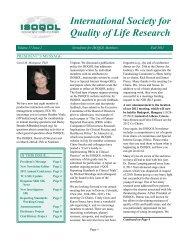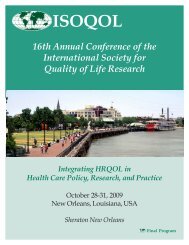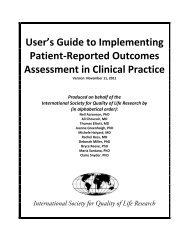Thursday, October 28, 2010 Thursday 7:00 am – 5:00 pm Registration and Exhibits West Wing Lobby A continental breakfast will be served at 7:30 am. Please be sure to visit the exhibits! 8:00 am – 6:45 pm Poster Session I on Display Viscount Suite and Foyer Poster numbers 1 through 104 are on display today (see page 36 through 42) 7:45 – 8:00 am Welcome/Remarks Room <strong>Conference</strong> Chairs: Stefan Cano, PhD and Jane Scott, PhD <strong>ISOQOL</strong> President: Diane Fairclough, DrPH 8:00 – 9:30 am Plenary Session: Psychometric Methods for Developing and Evaluating Rating Scales: Why I Do What I Do sponsored by ?? Chairs: Jeremy Hobart, PhD and Stefan Cano, PhD Speakers: Sandringham Suite Although classical test theory, generalizability theory and modern psychometrics (including Rasch analysis and IRT) are commonly discussed in <strong>ISOQOL</strong> meetings and publications in our journal, Quality of Life Research, the appropriate use of these different methods has not been discussed in a major forum within <strong>ISOQOL</strong>. To allow members to learn about the strengths and appropriate use of each of these models for psychometric analysis, session chairs Jeremy Hobart and Stefan Cano will lead what promises to be a lively session with some of the world’s experts in each of these methods answering the question “Why I Do What I Do”. OR? Rating scales play a critical role in shaping health care and health outcomes. Several psychometric methods are used to develop and validate health rating scales. Each has its strengths and no method is fully adequate to address all the requirements of rigorous psychometric validation. Session chairs Jeremy Hobart and Stefan Cano invite experts in each of these methods to present and discuss “Why I Do What I Do”. Invited speakers include leaders in the application of the following methods to patient reported outcome data: • Generalizability Theory • Item Response Theory • Rasch Measurement 9:30 – 9:45 am Break West Wing Lobby 9:45 – 11:15 am Concurrent Oral Sessions Mixed Methodology Chair: Karen Sousa, PhD Sandringham Suite 1713/What do people with dementia and their proxies say about HRQL? A quantitative test of qualitative findings Sarah C. Smith, Health Services Research and Policy, London School of Hygiene & Tropical Medicine, London, UK, Brendan Mulhern, John E. Brazier, School of Health and Related Research, University of Sheffield, Sheffield, UK, Donna L. Lamping, Department of Health Services Research and Policy, London School of Hygiene & Tropical Medicine, London, UK, Martin Knapp, 14
Thursday London School of Economics & Political Science, University of London, London, UK, Donna Rowen, School of Health and Related Research, University of Sheffield, Sheffield, UK, Vanessa Loftus, Sube Banerjee, Institute of Psychiatry, Kings College London, London, UK 1730/Validity in fatigue measurement: complementing quality and quantity Stefan J. Cano, Jeremy C. Hobart, Clinical Neurology Research Group, Peninsula Medical School, Plymouth, Devon, UK 1640/The benefits of mixed methods in scale development II: Selecting optimal mode of administration Claudia Gorecki, Clinical Trials Research Unit, University of Leeds, Leeds, West Yorkshire, UK, Jane Nixon, Clinical Trials Research Unit, University of Leeds, Leeds, West Yorkshire, United Kingdom, Donna L. Lamping, Health Services Research and Policy, London School of Hygiene & Tropical Medicine, London, United Kingdom, Julia M. Brown, Clinical Trials Research Unit, University of Leeds, Leeds, West Yorkshire, United Kingdom, Stefan Cano, Clinical Neurology Research Group, Peninsula College of Medicine and Dentistry, Plymouth, United Kingdom Responsiveness I Chair: John Broderson, PhD Hilton Meeting Rooms 1-6 1572/Responsiveness and Minimal Important Differences in EORTC QLQ-C30, EQ-5D and 15D in patients with multiple myeloma - A prospective study Ann Kristin Kvam, Haematology, Oslo University Hospital, Oslo, Norway, Peter Fayers, Applied Health Sciences, University of Aberdeen, Aberdeen, Scotland, Finn Wisløff, Medicine, University of Oslo, Oslo, Norway 1483/Minimally important differences for six PROMIS-Cancer scales Kathleen J. Yost, David T. Eton, Health Sciences Research, Mayo Clinic, Rochester, MN, Sofia F. Garcia, David Cella, Medical Social Sciences, Northwestern University, Feinberg School of Medicine, Chicago, IL 1294/Minimal important difference for individual subjects and groups of subjects - why the two cases should be distinguished Georg Kemmler, Johannes Giesinger, Lisa Wintner, Psychiatry and Psychotherapy, Innsbruck Medical University, Innsbruck, Tyrol, Austria, Hubert Denz, Internal Medicine, Natters State Hospital, Innsbruck, Tyrol, Austria, Bernhard Holzner, Psychiatry and Psychotherapy, Innsbruck Medical University, Innsbruck, Tyrol, Austria 1487/Using Multiple Anchor and Distribution-based Estimates to Determine the Minimal Important Difference (MID) for the Urticaria Activity Score (UAS) Susan D. Mathias, Outcomes Research, Health Outcomes Solutions, Winter Park, FL, Ross D. Crosby, Biomedical Statistics & Methodology, Neuropsychiatric Research Institute, Fargo, ND, James Zazzali, Health Economics & Outcomes Research, Genentech Inc, S San Francisco, CA Pediatrics Chair: Anne Klassen, DPhil Balmoral Suite 1237/Assessing The Impact Of Musculoskeletal Impairment On Children’s Quality Of Life In Malawi: Identifying The Concepts For Evaluation Yasmene Alavi, Infectious and Tropical Disease, London School of Hygiene & Tropical Medicine, London, UK, Vincent Jumbe, College of Medicine, University of Malawi, Blantyre, Malawi, Sally Hartley, School of Allied Health Professions, University of East Anglia, Norwich, UK, Sarah Smith, Donna Lamping, Health Services Research and Policy, London School of Hygiene & Tropical Medicine, London, UK, Christopher Lavy, Nuffield Department of Orthopaedic Surgery, Oxford University, Oxford, UK 1511/Predictors of Health Related Quality of Life of adolescents with Type 1 Diabetes Tatiana S. Novato, Sonia A. Grossi, Medical Surgical Nursing, University of São Paulo, São Paulo, São Paulo, Brazil, Balduino Tschiedel, Márcia K. Coutinho, Silvana E. Speggiorin, Ana M. Ferreira, Institute for Children With Diabetes, Nossa Senhora da Conceição Hospital, Porto Alegre, Rio Grande do Sul, Brazil 1786/On relationships of fatigue, quality of life and family impact among children with live-limiting illnesses I-Chan Huang, Mary Anderson, Epidemiology and Health Policy Research, Sanjeev Tuli, John Nackashi, Pediatrics, University of Florida, Gainesville, FL, Dennis Revicki, Center for Health Outcomes Research, United BioSource Corporation, Bethesda, MD, Elizabeth Shenkman, Epidemiology and Health Policy Research, University of Florida, Gainesville, MD 1704/Testing the Item Response Theory properties of the KIDSCREEN-10 HRQOL Index in school-children from 15 European countries Ulrike Ravens-Sieberer, Veronika Ottova, Michael Erhart, Child Public Health, University Medical Center Hamburg-Eppendorf, Hamburg, Hamburg, Germany 15
- Page 1 and 2: ISOQOL 17th Annual Conference of th
- Page 3 and 4: Schedule-at-a-Glance Wednesday Octo
- Page 5 and 6: Scientific Program Committee ISOQOL
- Page 7 and 8: About ISOQOL / General Information
- Page 9 and 10: Program Schedule Wednesday, October
- Page 11 and 12: Workshop 6 will not be presented We
- Page 13: Wednesday - Workshops Systematic re
- Page 17 and 18: Thursday Cancer Research Center, Se
- Page 19 and 20: Thursday Dennis A. Revicki, Center
- Page 21 and 22: for Neurology and Neurosurgery, Faz
- Page 23 and 24: Friday Surrey, UK, Clare Bradley, P
- Page 25 and 26: Friday with Skin Disease Sam Salek,
- Page 27 and 28: Friday DEVELOPMENT OF SYMPTOM MEASU
- Page 29 and 30: Hospital del Mar, Barcelona, Spain,
- Page 31 and 32: Saturday, October 30, 2010 Saturday
- Page 33 and 34: Saturday 11:30 am - 1:00 pm Plenary
- Page 35 and 36: Poster Session 1 - Thursday 14/1316
- Page 37 and 38: Poster Session 1 - Thursday 34/1151
- Page 39 and 40: Poster Session 1 - Thursday London,
- Page 41 and 42: Poster Session 1 - Thursday Chen, M
- Page 43 and 44: Poster Session 2 Friday, October 29
- Page 45 and 46: Poster Session 2 - Friday 133/1381/
- Page 47 and 48: Poster Session 2 - Friday 153/1373/
- Page 49 and 50: Poster Session 2 - Friday 177/1270/
- Page 51 and 52: Poster Session 2 - Friday Psychosom
- Page 53 and 54: Poster Session 3 - Saturday Urology
- Page 55 and 56: Methods & Methodology Poster Sessio
- Page 57 and 58: Poster Session 3 - Saturday ARAB, H
- Page 59 and 60: Poster Session 3 - Saturday 301/170
- Page 61 and 62: Exhibitors MAPI Institute & MAPI Re
- Page 63: Interested in Contributing to ISOQO
- Page 66 and 67:
Advertisements 66
- Page 68 and 69:
Notes 68
- Page 70 and 71:
Hotel Floor Plans Monarch Suite, We
- Page 72:
Mark your Calendar. . . ISOQOL 18th







